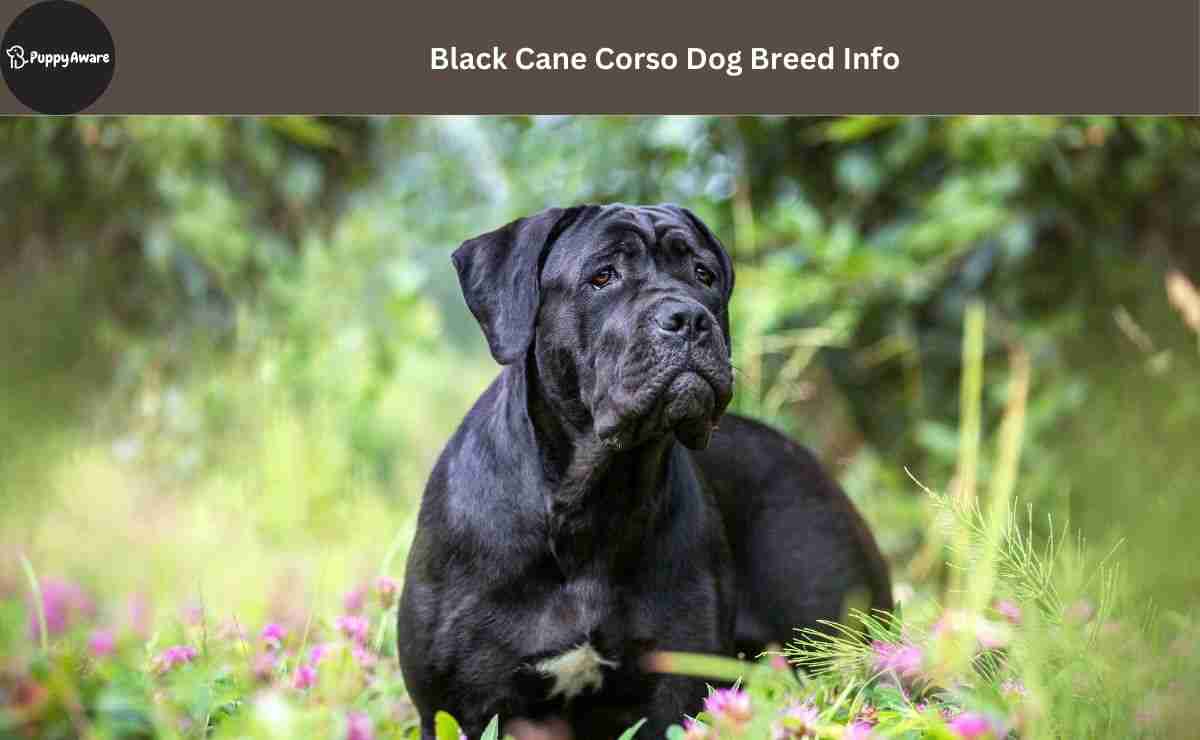The Black Cane Corso stands as a testament to centuries of careful breeding, combining the raw power of a Mastiff with the grace of an Italian nobleman’s companion.
While many are familiar with this breed’s imposing presence, few truly understand the depth of their character and the unique attributes that set the black variant apart from its peers.
The Majestic Black Cane Corso Dog Breed Info
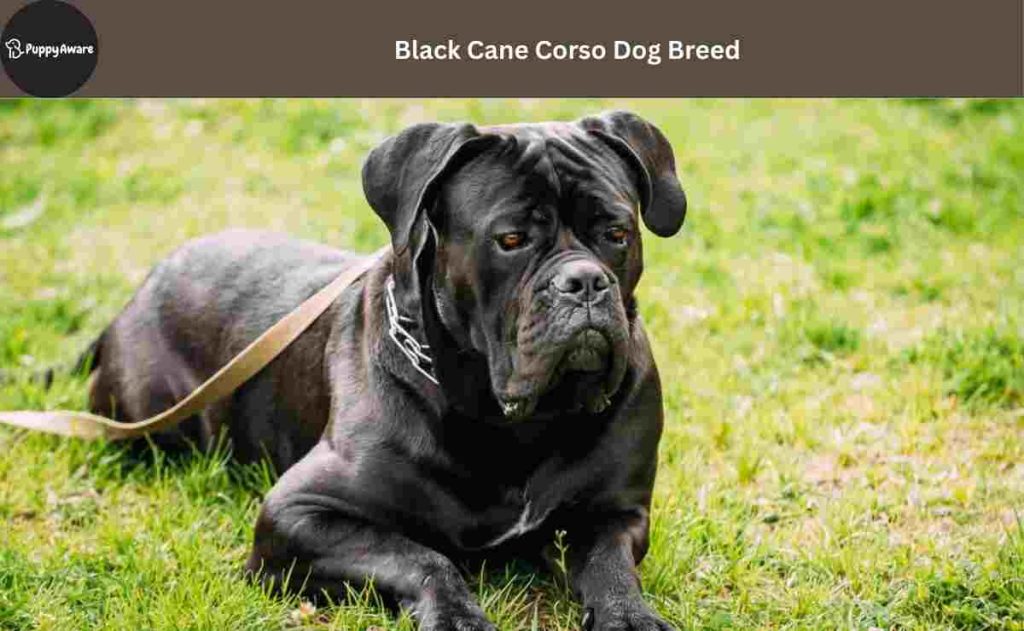
Origins and Historical Significance
The Cane Corso’s lineage traces back to ancient Roman times, where these dogs served as canis pugnax (war dogs) alongside Roman legionnaires.
The black coat variation, particularly prized among Italian nobility, emerged as one of the most sought-after colorations due to its intimidating appearance and practical advantages in guardianship duties.
Historical Timeline
| Period | Significant Development |
|---|---|
| Ancient Rome | Used as war dogs and guardians |
| Middle Ages | Transitioned to estate guardians and hunters |
| 1970s | Near extinction and recovery efforts begin |
| 1983 | Official recovery program launched in Italy |
| 2010 | AKC recognition achieved |
The Distinct Black Coat
The black Cane Corso possesses a coat that sets it apart from other variations:
- Genetics: True black coloration comes from a dominant black gene
- Appearance: Deep, lustrous black without brindling or markings
- Texture: Short, coarse, and dense with a light undercoat
- Maintenance: Moderate shedding with seasonal variations
Unlike common misconceptions, the black coat isn’t just about aesthetics – it serves practical purposes:
- Enhanced heat absorption in cold climates
- Natural camouflage during night guard duties
- Psychological advantage in protective situations
- Better UV protection for the dog’s skin
Physical Characteristics of the Black Cane Corso
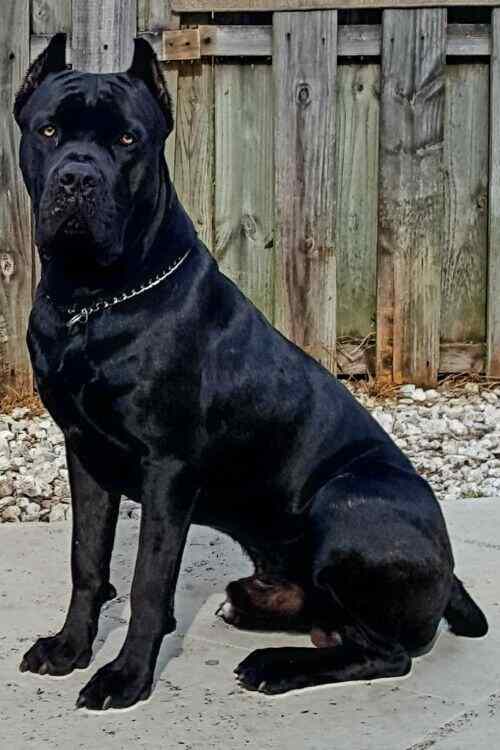
Size and Structure
The Black Cane Corso embodies power and athleticism in its build. Their measurements typically fall within these ranges:
| Feature | Males | Females | Notable Details |
|---|---|---|---|
| Height | 25-27.5 inches | 23.5-26 inches | Measured at withers |
| Weight | 99-110 lbs | 88-99 lbs | Lean muscle mass |
| Chest Depth | 12-14 inches | 11-13 inches | Essential for endurance |
| Body Length | 27-29 inches | 25-27 inches | Measured from point of shoulder to buttock |
Distinctive Features
The black variant showcases several distinguishing characteristics:
- Head Structure: Broad skull with pronounced stop and well-developed muscles
- Muzzle: Square-shaped, approximately 1/3 of total head length
- Eyes: Almond-shaped, typically dark amber in black specimens
- Bite: Slight undershot jaw with impressive bite force (700+ PSI)
Temperament and Personality Traits
Core Characteristics
The Black Cane Corso exhibits a complex personality profile that makes them unique among guardian breeds:
1.Intelligence and Trainability
- High cognitive function requiring mental stimulation
- Exceptional ability to read human emotions
- Quick learning capacity with proper motivation
2. Guardian Instincts
- Natural protective nature without excessive aggression
- Territorial awareness with balanced judgment
- Strong bond formation with family members
3. Social Dynamics
- Reserved but not shy with strangers
- Excellent with children when properly socialized
- Hierarchical understanding within family structure
Behavioral Traits by Life Stage
| Age | Behavioral Focus | Training Priority |
|---|---|---|
| 2-4 months | Social bonding | Basic commands & socialization |
| 4-8 months | Boundary testing | Leadership establishment |
| 8-18 months | Physical development | Advanced training & impulse control |
| 18+ months | Maturity settling | Refinement of learned behaviors |
Training and Socialization Requirements
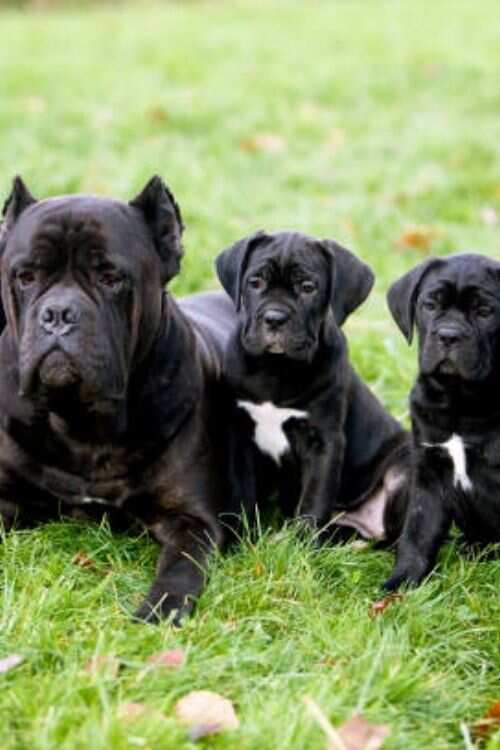
Early Training Fundamentals
The Black Cane Corso requires a structured training approach from an early age. A comprehensive training protocol should include:
Critical Training Periods
| Age Range | Focus Areas | Expected Milestones |
|---|---|---|
| 8-12 weeks | Basic obedience | Name recognition, Sit, Come |
| 3-6 months | Socialization | Exposure to various environments |
| 6-12 months | Advanced commands | Off-leash reliability, Stay |
| 12-24 months | Specialized training | Protection work, if desired |
Socialization Protocol
Proper socialization is crucial for developing a well-adjusted Black Cane Corso:
Environmental Exposure
- Urban environments and traffic
- Different weather conditions
- Various ground surfaces and terrains
- Diverse sound environments
Social Interactions
- Controlled meetings with other dogs
- Exposure to different human demographics
- Introduction to household activities
- Experience with livestock if relevant
Health Considerations and Management
Common Health Issues
The Black Cane Corso may be predisposed to certain health conditions:
| Condition | Prevalence | Preventive Measures |
|---|---|---|
| Hip Dysplasia | 32.9% | Regular screening, weight management |
| Entropion | 13.7% | Early detection, surgical correction |
| Dilated Cardiomyopathy | 11.2% | Cardiac screening, proper diet |
| Gastric Dilatation-Volvulus | 8.5% | Meal management, post-meal rest |
Preventive Healthcare Schedule
A comprehensive health maintenance plan includes:
Quarterly
- Heartworm prevention
- Flea and tick treatments
- Weight assessment
- Exercise evaluation
Bi-annual
- Dental examinations
- Blood work for adults
- Joint mobility assessment
- Behavioral evaluation
Annual
- Vaccinations
- Complete physical examination
- Cardiac screening
- Hip and elbow evaluation
Essential Care and Living Requirements
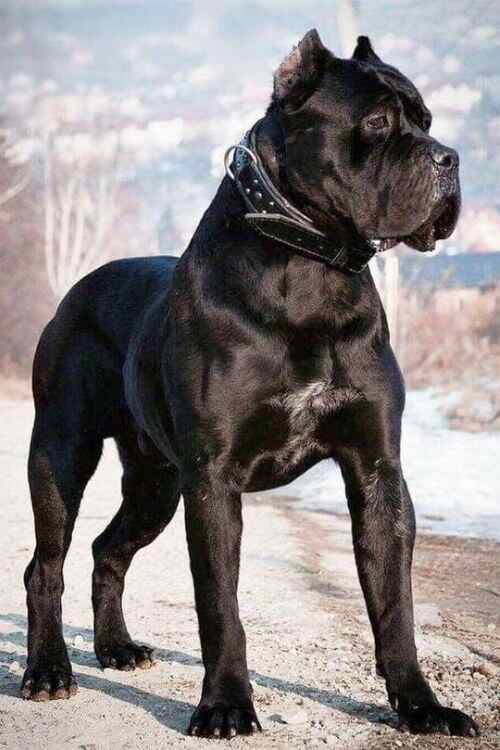
Exercise and Activity Needs
The Black Cane Corso requires structured physical activity to maintain optimal health:
| Activity Type | Duration | Frequency | Benefits |
|---|---|---|---|
| Structured walks | 45-60 mins | 2x daily | Mental stimulation, physical conditioning |
| Free play | 30 mins | 1-2x daily | Social bonding, energy release |
| Training sessions | 15-20 mins | 2-3x daily | Mental exercise, skill reinforcement |
| Agility/Sports | 30-45 mins | 2-3x weekly | Advanced physical conditioning |
Living Space Requirements
Despite their size, Black Cane Corsos can adapt to various living situations with proper management:
Outdoor Space
- Minimum yard size: 800-1000 square feet
- Secure fencing height: 6 feet minimum
- Shaded areas requirement
- Durable play/exercise zones
Indoor Accommodations
- Dedicated rest area: 4×6 feet minimum
- Temperature regulation: 65-75°F optimal
- Non-slip flooring in traffic areas
- Access to family living spaces
Nutrition and Dietary Management
Nutritional Requirements by Life Stage
| Life Stage | Daily Caloric Need | Protein % | Fat % | Special Considerations |
|---|---|---|---|---|
| Puppy (2-6 months) | 1,500-2,000 | 27-32% | 14-18% | Higher calcium needs |
| Junior (6-12 months) | 2,000-2,500 | 25-30% | 12-16% | Joint support supplements |
| Adult (1-6 years) | 2,200-3,000 | 22-26% | 12-15% | Weight management |
| Senior (7+ years) | 1,800-2,400 | 20-24% | 10-14% | Glucosamine supplementation |
Feeding Schedule and Practices
Recommended Feeding Protocol:
Puppies (2-6 months)
- 4 meals daily
- Measured portions
- Specialized puppy formula
Juveniles (6-12 months)
- 3 meals daily
- Transition to adult food
- Monitor growth rate
Adults
- 2 meals daily
- Fixed feeding times
- Portion control
Special Considerations for Black Cane Corso Ownership
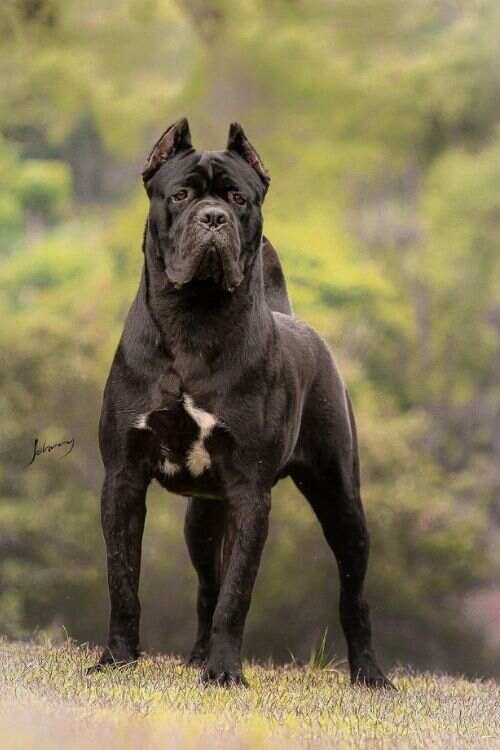
Climate Adaptation and Coat Care
The black coat requires specific attention based on climate:
| Climate Type | Special Needs | Recommended Actions |
|---|---|---|
| Hot Climate | Heat management | Early/late exercise, cooling mats |
| Cold Climate | Winter protection | Limited exposure, paw protection |
| Humid Climate | Skin monitoring | Regular checking, dehumidifiers |
| Dry Climate | Coat maintenance | Moisturizing treatments |
Professional Service Roles
The Black Cane Corso excels in various working capacities:
Security Work
- Personal protection
- Property guarding
- Estate security
- Family protection
Therapy and Service
- Emotional support roles
- Mobility assistance
- Therapy dog programs
- Search and rescue potential
Cost of Ownership
Initial and Ongoing Expenses
| Expense Category | First Year | Annual Thereafter | Notes |
|---|---|---|---|
| Purchase/Adoption | $2,000-4,000 | – | From reputable breeder |
| Medical Care | $800-1,200 | $500-800 | Including preventive care |
| Training | $1,000-1,500 | $300-500 | Professional sessions |
| Food/Supplies | $1,200-1,500 | $900-1,200 | Quality nutrition |
| Insurance | $600-800 | $600-800 | Comprehensive coverage |
Is a Black Cane Corso Right for You?
The Black Cane Corso represents one of the most impressive guardian breeds available today. However, successful ownership requires:
- Dedicated time for training and socialization
- Financial commitment for proper care
- Appropriate living space
- Experience with large, powerful breeds
- Long-term commitment (10-12 years)
For prospective owners, consider these essential steps:
- Research reputable breeders thoroughly
- Prepare your home environment
- Establish connections with professional trainers
- Set up a relationship with a knowledgeable veterinarian
- Join breed-specific communities for support
Conclusion
The Black Cane Corso offers unparalleled loyalty, protection, and companionship when matched with the right owner. Their combination of strength, intelligence, and devotion makes them an exceptional choice for those prepared to meet their needs.
Remember that responsible ownership of a Black Cane Corso isn’t just about providing care, it’s about fostering a partnership with one of the most remarkable guardian breeds in existence.
Related Topics
